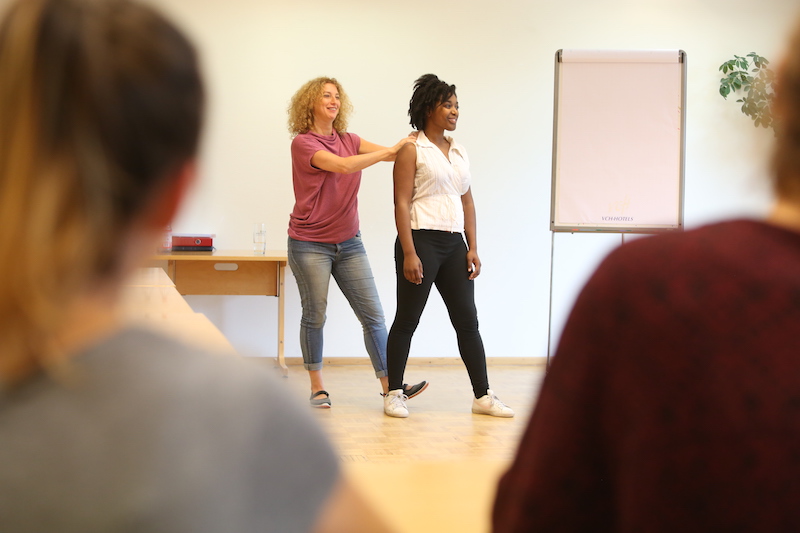
How I explored my ethnicity through my Pantarei studies
“What are your thoughts on the topic of racism and discrimination as a black Pantarei Practitioner?” This question is one I am often asked, whether out loud or there, present in the look people give me when I tell them what I do. This has been especially noticeable during these last few weeks, in which the the death of George Floyd, at the hands of a police officer in the US, has brought the topic of racial discrimination back into the limelight. I have many thoughts around this very significant topic. Yet, in response to this question, I usually give an account of my personal experience as a black woman living in Paris.
My Origins
I am originally from France, and was born in the suburb of Lyon in the early 80th. My parents are both from the French West Indies, more precisely from Guadalupe. They came to France during a big immigration movement in the 70’s to help rebuild the country in the aftermath of the Algerian War of Independence.
I spent most of my childhood in and around the ghetto city of “Vénissieux”, in an area called “Les Minguettes”. The city was well known for its high-rise towers, high rates of delinquency, fights against cops, drugs, its “colored” population, and also for the large Arabic population that lives there.
For me, this city was simply the place where I could find delicious dishes, shared with me by my Cambodian, Algerian, Moroccan and White French, friends. I was a young Black Girl in a multi-colored world, that l just loved to explore.

Growing up
The challenge of being a girl of color only really started when I grew up. I was good at school and loved music. Much to the surprise of both my teachers, as well as my parents, my true passion lay in classical music.
By expanding on my interests and exploring the world that lay outside the community that I had grown up in, I felt like I was stepping into new clothes. I had outgrown the clothes of my youth. Yet, these new garments were difficult for me to afford and I was not even sure I was allowed them. Nevertheless, it was clear that the time had come for me to step out of the social and familial cocoon I had grown up in, no matter how rich and diverse it was.
In my early days at school, there were at least a few other children of color in every class of around 33. At university, however, I ended up very much alone in an amphitheater of over 150 students. And this was for my classes in psychology. I can’t even begin to describe what my classical music school was like. I understood quickly that I had to be really good. There were so many of us. I had to excel so as not to be labeled the “poor Black girl” to be pitied and given extra leniency.
My Somatic Training with Claudia and Vered
After studying psychology, I wanted to learn how to incorporate the body into my work with clients. I then started my somatic training with Claudia and Vered. Again, I was the only colored woman in class, as well as the only French one. However, something was totally new to me, compared to my latest experiences of learning in groups. There was such a cultural mix. There were people from everywhere. I came into contact with Israelis, Swiss, Germans and Italians. Just like when I was a little girl, I felt I was not alone with my differences. We were all so different. And all these cultural differences made me realize how rich humanity is.
It was powerful to learn about the unique qualities of each human being, and enjoy what their diversity brought with it. And little by little, I reconnected with my childhood and the people from everywhere, each with their own story to share. Respect, a healthy dose of curiosity, and the desire to know each other for our qualities, are some of the things that impressed me most during these studies. It was just so great to approach uniqueness as a fundamental element of the classes themselves.

The words
I can remember one particular day in class. I was very motivated to work with even more clients, yet I found this to be very challenging. My style of work and the somatic approach was unknown in France.
Once again, I was doing something and being someone “different”. And Vered, with much empathy and consideration for my background and story, led me to a new found sense of confidence and joy in my uniqueness, that is so very beautiful and rich. With this experience, I felt my body melt. It was exactly this belief that I carried so deeply within me, yet not allowed myself to feel. And here she was, a White woman, who was not even from France, filled with such curiosity and openness for my perspective and points of view.
There were many moments similar to this one, in which the words of my “practitioners” helped me work through the taboos and the feeling of loneliness I had at being different. The fact that we could experiment with words in class, touched my heart deeply. Maybe I was the only Black woman in class with that particular story, but I was certainly not the only person with a particular story!

The touch
I remember another related session I got during these studies. I found myself crying because I felt how deeply my body remembered the devastating events that my ancestors lived through, in the times of slavery. This intensity came out of the blue as I hadn’t realized that this could even be possible to feel. I also realized how strongly I believed that “being different” is bad; is weird; means to be less than others, less than White. The issue with this kind of pain for me, is the shame associated with it.
I remember that the touch I received in this session was like balm on this old pain without name and without face. And I remember that after the rest, I woke up and just told myself, with a sense of deep inner strength, that slavery was over; that I didn’t have to stay small. I also recall, that when I told this to my practitioner, I saw how she had not even realized the extent to which her touch had so deeply affected me. She had managed to break through a wall that I had recreated inside of me.
I recently saw a post by Vered on Facebook saying that touch is a universal language. So true…
During this period of my studies, I was scared of being myself. I was angry with the ghost that prevented me from being who I am. But I learned how humanity can give back to humanity, using all the senses that nature has given us. And I learned to heal.
As a Pantarei Practitioner, today
Nowadays, racism aimed personally at me, means very little. This is thanks to the many times in which I had the experience of being more than the color of my skin. Thank you to the practitioners who decided to show themselves as humans. Thank you to those who don’t reduce themselves to the color of their skin, their gender or a particular body part or image.
Now I know that to be complete; to be full, is to accept and value our own uniqueness. It is a really deep challenge. Yet, experimenting with this, in my opinion, is one way in which to reeducate those who think that differences are dangerous and have to be eliminated. We can teach them that they are more than their beliefs.
I am glad to see that out of this challenge, a profession was created. Some of us will work with it everyday. And others will even be able to earn our livelihood from this precious activity.
Written by Nelly Biodore


